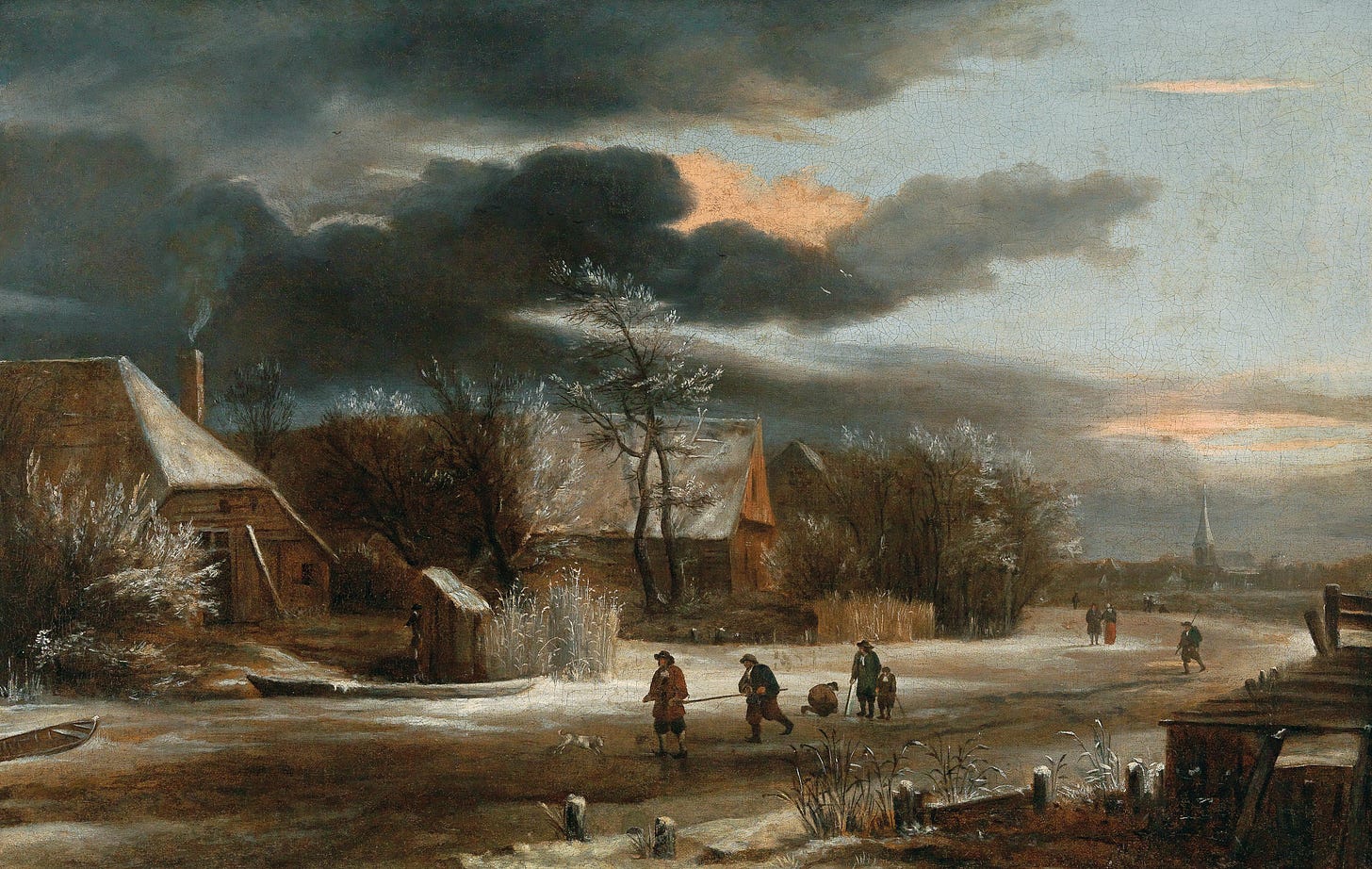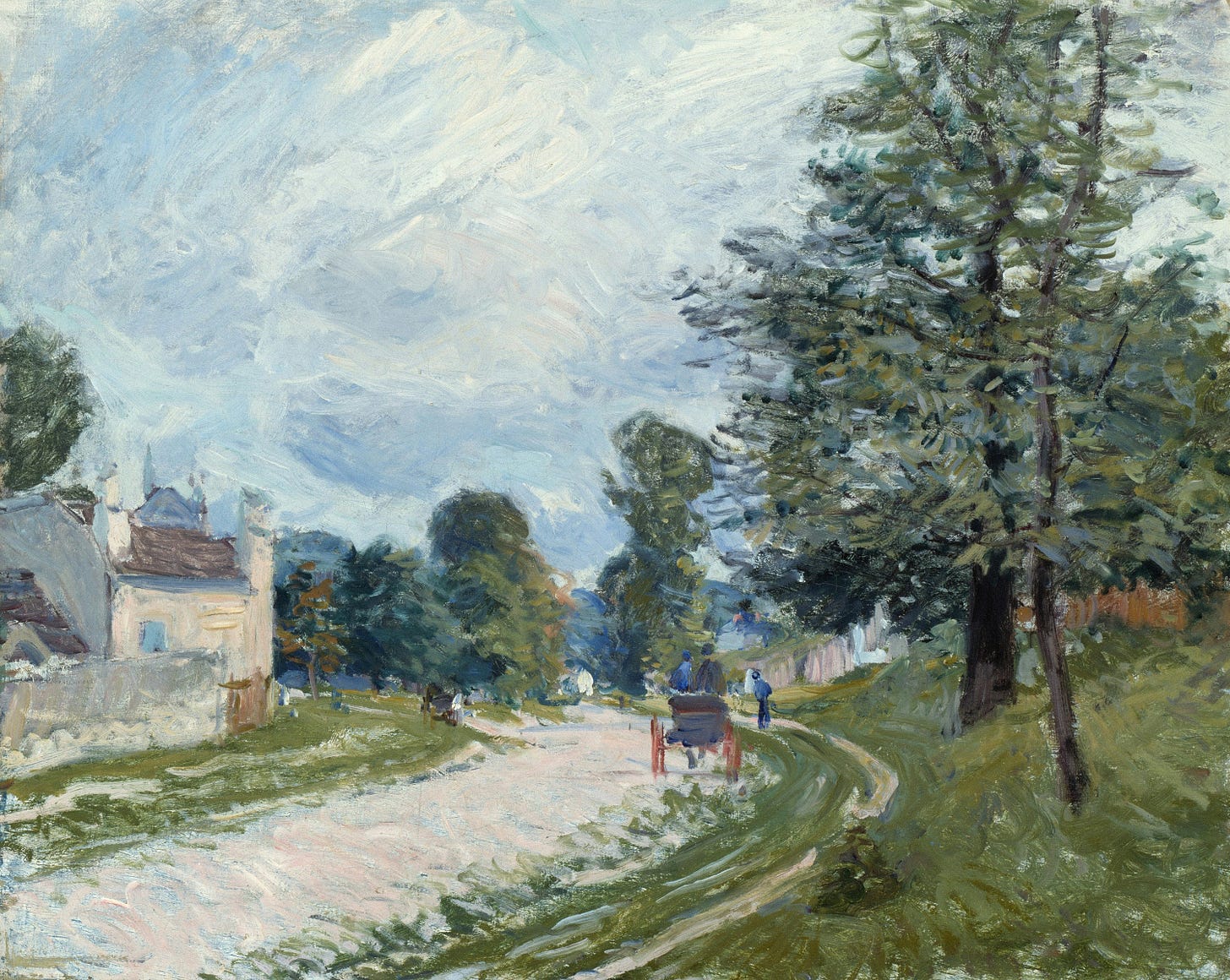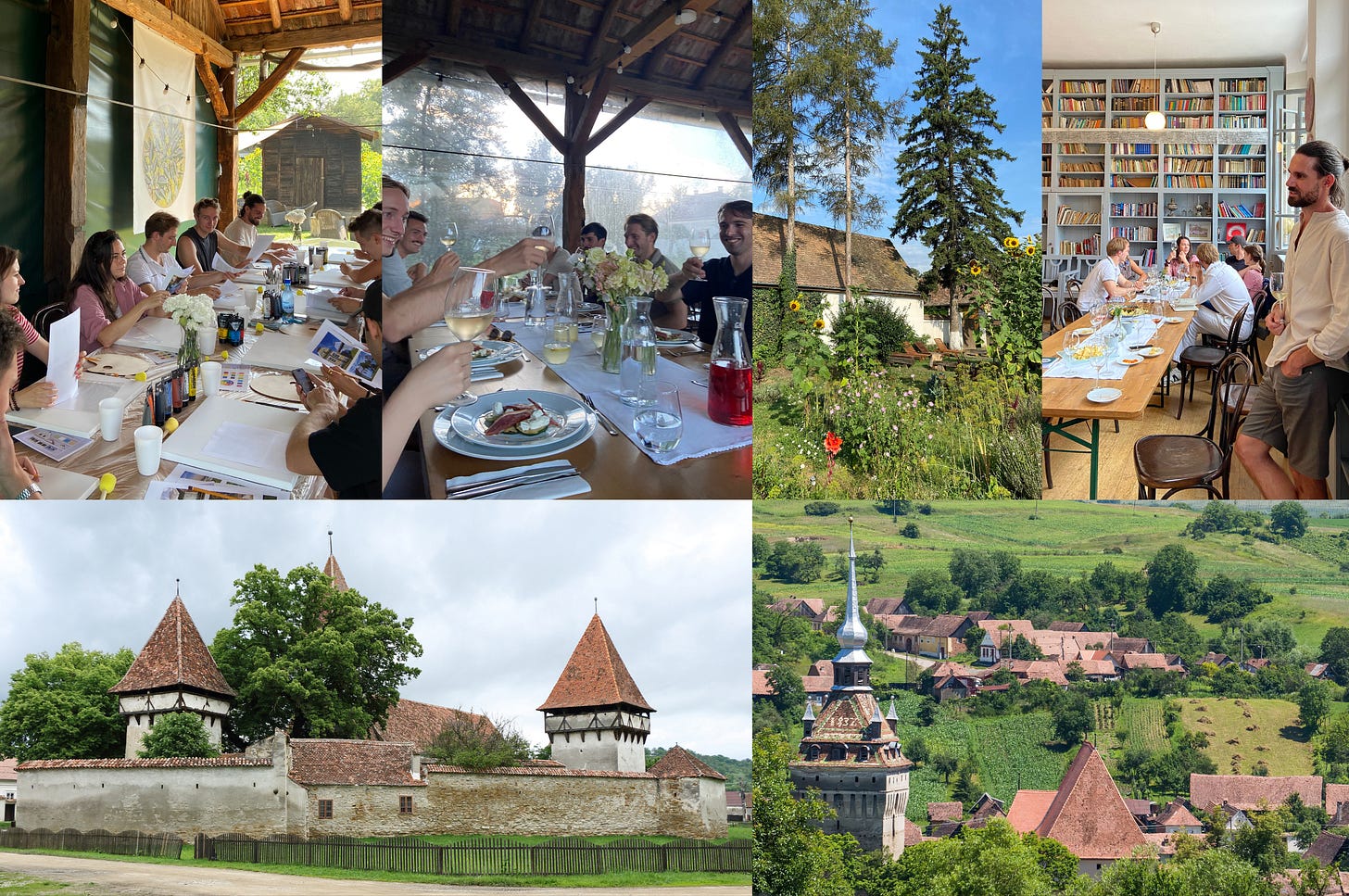On the Decline of Travel
SA Episode #17
IT’S LATE MORNING and I’m walking the narrow streets of Catania, Sicily, together with my future wife. At some point, we decide to get a coffee and admire the scene. Even though it’s an ordinary day in November—I recall it was Tuesday—the place permeates with attitude.
There are almost no tourists in sight. The architecture has a scruffy elegance. There’s laundry hanging from the windows. Children are playing football. Four Sicilian middle-aged men, sitting on the table in front of their butcher, are talking loudly while eating some raw meat.
We finish our coffee and then move toward Piazza del Duomo. In the southwest corner of the square, there’s an entertaining scene, full of singing salesmen. Shouting and gesticulating, they try to get the buyers’ attention with fresh fish, seafood, fruit, and veg stalls, as well as cheese and mushrooms from the mountain villages around Etna. The area is hectic, wet, dirty, and smelly.
The workday ends soon after we get there; people instantly gather at their favorite hangouts. We try to blend in with the locals, entering a taverna. We order Involtini di Pesce Spada and one bottle of wine some chatty fellows recommend.
In Sicily, I learned that even top managers working for large companies aren’t impressive—no matter how much money they make. Among Sicilians, the goal is to be free and self-employed.
Tourism is a Disease
You may recognize a profuse amount of excitement on many people’s faces these days as soon as they’re asked about their favorite hobby, proudly asserting “I love to travel”—failing to gauge that, well, everyone does. They somehow believe they designed such an original ambition or unique personality trait no one has ever heard of before.
The problem with “traveling the world” is when it becomes a goal in and of itself rather than a by-product. Almost nothing of value is accomplished through travel for the sake of travel. The best travel experiences have little to do with travel—maybe you visit a dear friend, work on an exciting project, learn a new skill, or volunteer for an NGO you deeply admire. Travel is only a means to an end. If you travel for the purpose of friendship, art, study, research, or philanthropy—criticism isn’t welcome.
What I love about Ruisdael is that he doesn’t shy away from the harsher realities of the Dutch landscape—how cold, gray, and bleak it can be. There’s a raw honesty in his depiction of the Netherlands; he portrays it with the same reverence that others might reserve for sunny, picturesque scenes.
Let’s define “tourism” this way: tourism is what happens when your happiness during a trip is dictated by weather conditions, food quality, things “to do,” taking nice pictures, and collecting souvenirs. I love the way Valene Smith describes a tourist: “A tourist is a temporarily leisured person who voluntarily visits a place away from home for the purpose of experiencing a change.” The last part is critical: “for the purpose of experiencing a change.” What exactly gets changed, though? Many go to Spain and complain about how their siesta culture ruins their sightseeing schedule. Many go to Italy and complain about poor breakfast options or why waiters refuse to bring ketchup to their table. Someone I know has recently traveled to Sicily and spent a few days in a village near Palermo. She came back disappointed, as it “wasn’t that cute” compared to her expectations. One seemingly unimportant event stood out to me though: during lunch, she checked out the only tavern available and initially ordered a lemonade. After the first sip, she grimaced with disgust, as the lemonade had no sugar, was extra sour and extra salty. She asked the bartender to change it, and his reply said it all: “Tourist? I will bring you sugar.” Locals in Sicily, to deal with the summer heat, treat lemonade differently: instead of something sweet, it’s served as a sharp drink meant to quench thirst and restore minerals lost in the sun.
You think you’re going somewhere to change but you’re changing the locals. In her book, Hosts and Guests, Valene Smith came up with a striking observation: “Tourists are less likely to borrow from their hosts than their hosts are from them, thus precipitating a chain of change in the host community.” We go to experience a change, but end up inflicting change on others.1 I traveled to Istanbul for a friend’s wedding a few years ago and found it fascinating that many shisha places (around the touristic areas) had alcohol options on their menus. Then I overheard some clients speaking Russian, and I made the connection.2 Everyone is praising Bali’s “progress” in the last 10-15 years, how it now meets Western standards; how it’s full of polished resorts, how you can sip Matcha lattes on every corner, and how there’s always a prepackaged spiritual activity available to sign up for.3
Too much tourism makes locals consider they could make a living solely off tourism; which means they give up on the organic beauty and pace of their lifestyles—exactly the reason many people want to go there. But then some locals quickly figure this out and choose to commoditize and fake their lifestyles to meet tourists’ expectations, so they can go back home and brag about how “authentic” their travel experience was. There’s a village in Austria that suffers from this; I won’t mention it as I don’t want to make the problem worse. Some locals are letting their cattle roam freely on the street on Sunday to impress tourists.4 We may refer to this as the “staged authenticity” problem. Tourists seek “the real thing.” Locals adapt to meet that demand. The “real thing” becomes performance. Tourists then mistake the performance for authenticity, reinforcing the cycle. And—the greatest damage—locals no longer know who they are; tourism thus breeds identity crises.5
Hosts therefore either change by trying to make guests feel at home—by selling them frappuccinos—or match what tourists consider “authentic.” Or a little bit of both, losing themselves and their culture in the process.
“The problem isn’t the places themselves, nor the traveler’s desire to see them, but rather travel’s dehumanizing effect,”6 reducing everything to well-designed entertainment products. The problem isn’t travel or tourism but the scale of it.7
Freedom Materializes with Commitment
“In this age when every famous site is desecrated by hordes of tourists, the only way for a reverent pilgrim to honor a sacred shrine is to simply not go there.” — Nicolás Dávila
One accomplishment and tragedy of the modern world is that we now enjoy an incredible ease and comfort in terms of logistics. More and more incredible places are reachable in the luxury of passenger aircrafts and private cars, thus making even the holiest sites just one destination among others. Ramon Elani isn’t wrong: “It’s impossible to imagine any shrine remaining in the world today that’s not littered with fast-food wrappers, where the air is not deafened by the voices of irreverent tongues shouting into their cell phones. In general, it seems that modern man is really only likely to be on the path toward God when he stays put.”8
Your “obsession” with travel may reveal an uncomfortable fact: you’re afraid of commitment, of installing your roots somewhere. You’re a parasite that benefits from everyone but invests your heart and soul nowhere, branding this as an achievement: you eat great food, see great places, and go somewhere else when you get bored. You don’t make an impact by being a “traveler.” You don’t do anything at all. You just see. You just enjoy. You ran away from building a lifestyle packed with a loving family and strong friendships; you ran away from the opportunity to make a difference somewhere.9
Let’s be clear: I’m not trying to argue that taking a few vacations per year is “bad”—the desire to rest and relax, in whatever conditions you wish, has nothing to do with this essay. What I’m talking about is a subtle pyramid scheme which lures more and more people into forging a persona around travel, into marketing travel as an edifying virtue that allows you to crack a golden aura of wisdom you simply can’t miss out on.
The best part about a vacation is getting back home—and hopefully realizing you have a life you need no vacation from.
Traveling the world is overrated; embracing your homeland deeply is underrated. We likely can’t appreciate our homeland if we haven’t traveled somewhere else first. But once we travel a little, this sensation becomes obvious. What I learned from my travels to France or Belgium was to be more satisfied with Romania, and implicitly Transylvania, where I live. It’s trendy to travel to the Greek islands to learn how to “do nothing” but the same (better?) cultural experience could be gained if you were to cycle to a remote village from your country of origin, live there for a few weeks, helping out the locals with their chores, drinking as they do, partying as they do.
Travel as a Form of Therapy
Perhaps the greatest mistake we make when it comes to travel is that we only think of it as fun and relaxed; that it should be an escape. Emil Cioran’s favorite leisure activity was to travel by bicycle around France, exploring the countryside—always making sure to stop by the cemeteries he came across to meditate on death and the meaning of life.10 Nietzsche spent long stretches traveling through the Swiss Alps and northern Italy. His stays in Sils-Maria weren’t vacation but pilgrimage: he would walk the mountains to wrestle with his thoughts, shaping Thus Spoke Zarathustra. Theodore Roosevelt lost his wife and mother on the same day, and he went to the Dakota Badlands where the harsh frontier rebuilt his toughness; later his River of Doubt expedition in the Amazon nearly killed him but served as a test of will. Herman Melville shipped out as a sailor not to see the world but to confront it, and his voyages through the Pacific islands became existential schooling that fueled Moby-Dick.
These examples showcase how travel can be therapeutic only if it serves a clear and noble purpose; these adventures wouldn’t be the same if they weren’t founded on a mission, project, or spiritual healing process. Mircea Eliade wrote that “reflections make you great, not experiences per se.” Indeed, there are many young people who don’t lack experiences but their understanding. Their lives are bursting with adventures! They’ve traveled the world and seen things you can’t even imagine. The problem? They’re yet to nourish and milk these events. As soon as you have a conversation with them—despite their impressive portfolio—you realize they don’t know much. I’ve recently met someone my age who now enjoys unlimited success; he’s living like a rockstar and visits a new country every month. Yet he’s spiritually and emotionally mundane.
“Do you think you are the only person to have had this experience? Are you really surprised, as if it were something unprecedented, that so long a tour and such diversity of scene have not enabled you to throw off this melancholy and this feeling of depression? A change of character, not a change of air, is what you need. Though you cross the boundless ocean, though lands and towns are left astern, whatever your destination—you will be followed by your failings. Here’s what Socrates told someone in a similar context: ‘How can you wonder your travels do you no good, when you carry yourself around with you? You are saddled with the very thing that drove you away.’ How can novelty of surroundings abroad and becoming acquainted with foreign scenes or cities be of any help? You are running away in your own company. You have to lay aside the load on your spirit. Until you do that, nowhere will satisfy you.” — Seneca
Art & Philosophy Retreat | October 13–15, 2025 | Rural Transylvania
Last summer, we came together in Transylvania for a few days of wine, art, philosophy, and slow living. What began as a playful experiment is growing into a tradition. This year, I hosted the second edition of “Sipping Wine in Transylvania” in July. The next edition takes place in October. I intend to organize just a few retreats every year, as I don’t want to risk turning this into an “industrial” product.
I’m faced with two choices when it comes to travel: complain about the quality of travel or help make it a little bit better.
In October, we return to the Saxon villages of Transylvania, with fortified churches and medieval architecture. The goal is to challenge you with a new philosophy of work and leisure. An avant-garde Dolce far Niente. We’ll explore themes such as:
how to waste your time
the art of procrastination
how to combat burnout
take 180+ days off/year
Why Transylvania?
“When I first visited the Saxon villages of Transylvania almost fifteen years ago, I was deeply impressed by how these medieval settlements and the wild countryside which surrounds them had remained so well preserved for so many hundreds of years. Together, they formed an extraordinary landscape and harmonious farming system, uniquely rich in biodiversity, which was the only example of its sort left in Europe.” — King Charles
Send an email to viziandrei@outlook.com if you’d like to join one of the upcoming retreats. Please include the word RETREAT in the subject line.
The Case Against Travel by Agnes Callard (Article)
A few hours after I published this essay, someone I know messaged me. He just got back from Croatia, where he stayed in Fažana, Istria. While looking for restaurants that served something local and traditional, he realized it was very hard to find one. In almost every restaurant, out of the whole menu, there were only two traditional dishes. So he asked the waiter why it was so difficult to find local recipes. The waiter explained that they had to adapt to the demands of German tourists, who only want to eat meat with potatoes.
If you’re well off, maybe instead of spending $10K on your 1-month vacation to Bali to “develop yourself spiritually”—consider investing in a cozy home library dedicated to leisure, reading, and reflection.
Traditionally, Sunday is reserved for rest, and animals would thus have been kept in the barn.
Italians, at some point, will believe they indeed only eat pizza and pasta.
The Case Against Travel by Agnes Callard (Article)
One book I wholeheartedly recommend is The Art of Travel by Alain de Botton.
The Authentic Reactionary: Selected Scholia of Nicolás Dávila
Why your Obsession with Travel Means You’re Living a Mediocre Life by Jeffrey Grey (Article)
The reason cemeteries make you feel more alive is because you can’t possibly reflect on death; death is weird, mysterious. We don’t understand it. Hence you reflect on the quality of your life, how to live well and how to die well.






Travel can become a disease at some point; your argument, as I can see, is not that you are against travel, but against too much travel or against travel for the sake of travel...I fully agree that the greatest issue is this: we brand "traveling the world" as some sort of virtue, when it is simply a privilege
Great article. I still think traveling is important at least 2-4 times per year for me specifically. I live in the States and there no culture here, so I need to travel more than 4 times a year. Hopefully will be living in Europe one day to enjoy all the culture and history.